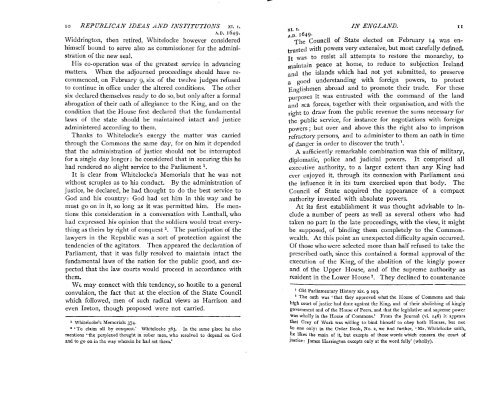HISTORY OF ENGLAND
HISTORY OF ENGLAND
HISTORY OF ENGLAND
- No tags were found...
You also want an ePaper? Increase the reach of your titles
YUMPU automatically turns print PDFs into web optimized ePapers that Google loves.
10 REPUBLICAN IDEAS AND INSTITUTIONS XI. I.A.D. 1649.Widdrington, then retired, Whitelocke however consideredhimself bound to serve also as commissioner for the administrationof the new seal.His co-operation was of the greatest service in advancingmatters. When the adjourned proceedings should have recommenced,on February g, six of the twelve judges refusedto continue in office under the altered conditions. The othersix declared themselves ready to do so, but only after a formalabrogation of their oath of allegiance to the King, and on thecondition that the House first declared that the fundamentallaws of the state should be maintained intact and justiceadministered according to them.Thanks to Whitelocke's energy the matter was carriedthrough the Commons the same day, for on him it dependedthat the administration of justice should not be interruptedfor a single day longer : he considered that in securing this hehad rendered no slight service to the Parliament l.It is clear from Whitelocke's Memorials that he was notwithout scruples as to his conduct. By the administration ofjustice, he declared, he had thought to do the best service toGod and his country: God had set him in this way and hemust go on in it, so long as it was permitted him. He mentionsthis consideration in a conversation with Lenthall, whohad expressed his opinion that the soldiers would treat everythingas theirs by right of conquest 2. The participation of thelawyers in the Republic was a sort of protection against thetendencies of the agitators. Then appeared the declaration ofParliament, that it was fully resolved to maintain intact thefundamental laws of the nation for the public good, and expectedthat the law courts would proceed in accordance withthem.WE, may connect with this tendency, so hostile to a generalconvulsion, the fact that at the election of the State Councilwhich followed, men of such radical views as Harrison andeven Ireton, though proposed were not carried.' Whitelocke's Memorials 374.'To claim all by conquest.' Whitelocke 363. In the same place he alsomentions 'the perplexed thought in sober men, who resolved to depend on Godand to go on in the way wherein he had set them.'XI. I. IN <strong>ENGLAND</strong>.A.D. 1649.The Council of State elected on February 14 was entrustedwith powers very extensive, but most carefully defined.was to resist all attempts to restore the monarchy, tomaintain peace at home, to reduce to subjection Irelandand the islands which had not yet submitted, to preservegood understanding with foreign powers, to protectEnglishmen abroad and to promote their trade. For thesepurposes it was entrusted with the command of the landand sea forces, together with their organisation, and with theto draw from the public revenue the sums necessary forthe public service, for instance for negotiations with foreignpowers; but over and above this the right also to imprisonpersons, and to administer to them an oath in timeof danger in order to discover the truth '.A sufficiently remarkable combination was this of military,diplomatic, police and judicial powers. It comprised allexecutive authority, to a larger extent than any King hadever cnjoyed it, through its connexion with Parliament ancithe influence it in its turn exercised upon that body. TheCouncil of State acquired the appearance of a compactauthority invested with absolute powers.At its first establishment it was thought advisable to includea number of peers as well as several others who hadtaken no part in the late proceedings, with the view, it mightbe supposed, of binding them completely to the Commonwealth.At this point an unexpected difficulty again occurred.Of those who were selected more than half refused to take theprescribed oath, since this contained a formal approval of theexecution of the King, of the abolition of the kingly powerand of the Upper House, and of the supreme authority asresident in the Lower House 2. They declined to countenance' Old Parliamentary History xix. g sqq.a The oath was that they approved what the House of Commons and theirhigh court of justice had done against the King, and of their abolishing of kinglygovernment and of the House of Peers, and that the legislative and supreme powerwas wholly in the House of Commons! From the Journal (vi. 146) it appearsthat Grey of Wark was willing to bind himself to obey both Houses, but notto one only: in the Order Book, No. 2, we find further, 'Mr. Whitelocke saith,he likes the main of it, but excepts of those words which concern the court ofjustice: James IIarrington excepts only at the word fully' (wholly).I I
















